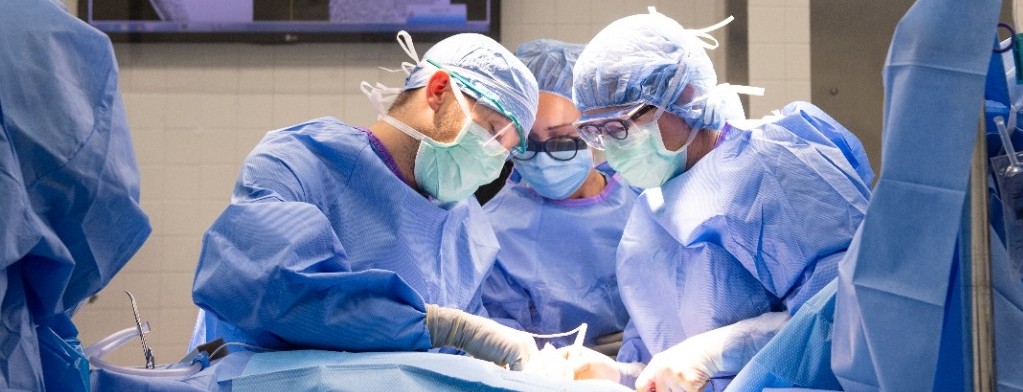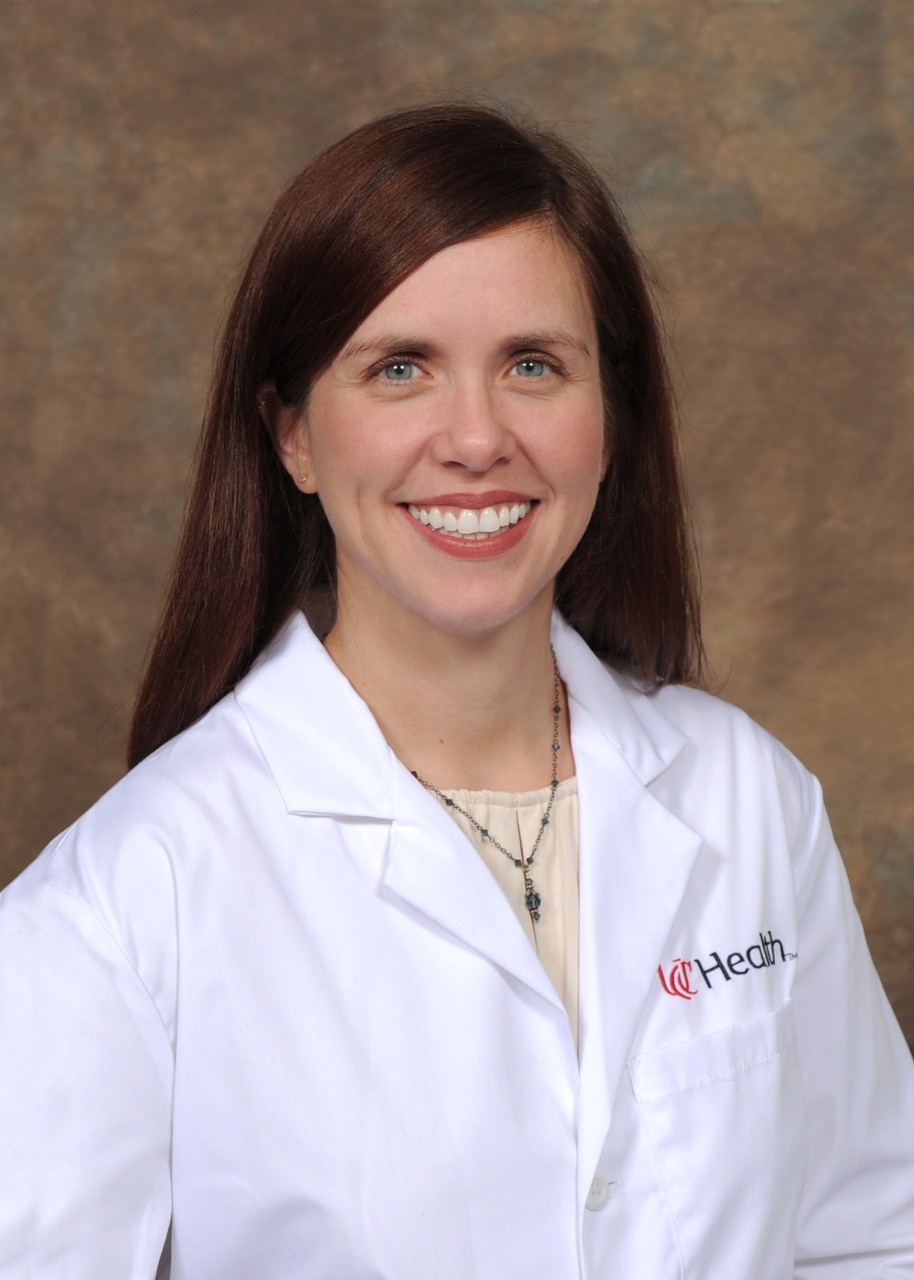
UC study: ‘GPS’ seed devices effective in localizing breast tumors
SmartClips improve efficiency, patient comfort, expert says
University of Cincinnati Cancer Center researchers found a seed device that acts as a GPS for surgeons to locate and remove breast and lymph node tumors was safe and effective.
The feasibility study evaluating the use of the devices, called SmartClips, was recently published in the journal The American Surgeon.
UC’s Jaime Lewis and her colleague Elizabeth Shaughnessy helped test the SmartClip devices as they were being developed.

Jaime Lewis, MD. Photo/University of Cincinnati.
“We went a few times and saw the different prototypes, worked with them, and provided feedback. Then we were one of the first institutions to use the SmartClips when they became commercially available in 2020,” said Lewis, a Cancer Center physician-researcher and associate professor of surgery in the UC College of Medicine. “Now, I’ve done more surgeries than any other surgeon with the SmartClip.”
The research team reviewed 100 patients whose tumors were marked, or localized, using SmartClips. Lewis said using SmartClips was equivalent in aiding surgeons in localizing and removing the tumor compared to the traditional technique using a needle and wire and may be safer when used to mark lymph node tumors for excision.
The traditional needle and wire technique is typically done on the day of surgery and can be cumbersome and uncomfortable for patients. SmartClips can be implanted at any time prior to surgery, and Lewis said surgeons can quickly learn the technique needed to use them in the operating room.
Patients definitely seem to be happier, I think surgeons are happier, the radiologists are happier, and it makes the flow of patients through procedures much better.
Jaime Lewis, MD
“The patient doesn’t have this needle and wire coming out of their breast that we’re trying to work around the day of surgery that may limit our ability to use a certain incision,” Lewis said. “There’s always a risk when patients are undergoing localization that they can pass out. So if the localization is performed on a different day, we reduce the need to cancel their surgery and delays in localization don’t slow down the progress of the day.”
Lewis said using SmartClips improves efficiency since radiologists can schedule the implantation when it works best for them, and then the day of surgery is also shorter.
“Most people prefer two visits rather than one very long day, and they like the idea of not having the needle and wire sticking out,” she said. “But I think the real benefits from my perspective are the facilitation of the operative schedule and not interfering with the surgeons’ choice of incision.”
SmartClips are one of a number of devices, including radioactive, radiofrequency and magnetic seeds, that have been introduced to better localize breast tumors. Lewis said the move to these new devices and eliminating the wire and needle technique is a positive development for patients and clinical teams, though a full cost-benefit analysis should be conducted in the future.
“There’s still some technical glitches with it, but I do think that a device like this or another iteration of the future is definitely where we should go,” she said. “Patients definitely seem to be happier, I think surgeons are happier, the radiologists are happier, and it makes the flow of patients through procedures much better. There are some improvements that could be made, but getting rid of needles and wires will help with a number of those things.”
Screening is key
Early detection of breast cancer increases treatment options and survival rates. The University of Cincinnati Cancer Center's Mobile Mammography Unit is equipped with the latest in mammogram screening technology and offers a comfortable registration area, waiting space and private changing room.
Screenings typically take 15 minutes, with results sent to providers within 1-3 business days.
Other study authors include Elizabeth Shaughnessy, MD, PhD; Leah Hefelfinger; Alexander Doherty; Rifat Wahab, DO; and Lauren Rosen, MD. The authors declare no relevant conflicts of interest and have no financial interests with Elucent, the company that makes SmartClips.
Featured photo at top of University of Cincinnati Cancer Center breast cancer surgeons working in the operating room. Photo/Colleen Kelley/UC Marketing + Brand.
Related Stories
President picks exceptional talent
April 28, 2021
The University of Cincinnati 2021 Presidential Leadership Medal of Excellence Awards honor six undergraduate scholars for scholarship, leadership, character, service and the ideals of the university. Awardees are spotlighted for exceptional academics, creativity, community service and innovation.
Grad students earn president's highest honor
April 28, 2021
The University of Cincinnati 2021 Presidential Medal of Graduate Student Excellence Awards honor three graduate scholars for scholarship, leadership, character, service and the ideals of the university. Awardees are spotlighted for exceptional academics, creativity, community service and innovation.
Local 12: 180 UC med students receive white coats, students embark on journey during pandemic
August 9, 2021
The University of Cincinnati College of Medicine welcomed 180 newly admitted first-year students during the college’s 26th annual White Coat Ceremony. The ceremony was held Friday at 10 a.m. at Cincinnati Music Hall, 1241 Elm Street. Each member of the class of 2025 were presented with a white lab coat, symbolizing entry into the medical profession. Local 12 covered the event.
Finding community and building a future
July 9, 2021
As a University of Cincinnati College of Medicine student, Sarah Appeadu, MD, ’21, remembers journaling on the “3 Cs” that got her through medical school: Community, community, community. Now, when she lists the people who supported her through four years of training—the last year in a global pandemic—it keeps growing: her family, her church, her classmates, and the college’s Office of Student Affairs and Office of Diversity, Equity and Inclusion. “I look back and it was such a crucial time to really be nurtured in that way,” she says. “I’m so thankful that I had those people. It shows being around the right people really mattered. That’s my same hope for residency even.”
UC to honor 2,079 grads at summer Commencement
August 2, 2021
UC celebrates the 2021 summer Commencement on Friday in two ceremonies at Fifth Third Arena. On Saturday, UC will recognize 2020 grads with an in-person Commencement celebration.
New York Times: Flint Weighs Scope of Harm to Children Caused by Lead in Water
February 1, 2016
Kim Dietrich, a professor of environmental health at UC's College of Medicine, is quoted in this story on the medical problems that could develop among the thousands of young children exposed to lead-contaminated water in Flint, Mich.
Cancer-Causing Gene Found in Plasma May Help Predict Outcomes for Patients
February 18, 2016
Researchers at the University of Cincinnati have discovered that a human cancer-causing gene, called DEK, can be detected in the plasma of head and neck cancer patients.
UC Receives $1.9 Million to Study Pain
February 15, 2016
Jun-Ming Zhang, MD, of the UC College of Medicine, is the principal investigator of a $1.95 million grant to study the interacting roles of the sympathetic and sensory nervous and immune systems in back and neuropathic pain models.
MD Magazine: Generic Drug Equally Effective in Epilespy
February 22, 2016
Michael Privitera, MD, a professor of neurology at UC's College of Medicine and director of the Epilepsy Center at the UC Neuroscience Institute, is featured in this story about research he led that examined the efficacy of generic drug substitution for epilepsy.
UC to Host Regional Conference for Latino Medical Student Association
February 10, 2016
The University of Cincinnati chapter of the Latino Medical Student Association (LMSA) will host a Midwest regional conference Feb. 26-28, 2016, at the College of Medicine.
